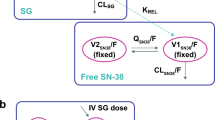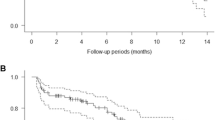Abstract
Background
Patients with metastatic renal cell carcinoma (mRCC) and a good performance status typically receive an anti-vascular endothelial growth factor receptor (VEGFR) TKI (sunitinib or pazopanib) as initial therapy. Upon disease progression or intolerance, there are four orally administered agents approved in the second-line setting (including cytokine-refractory). However, head-to-head comparative trial data are limited. In this study, an indirect statistical comparison of safety and efficacy was undertaken between axitinib, sorafenib, pazopanib and everolimus in second-line therapy mRCC.
Methods
A systematic review of major databases was conducted from January 2005 to June 2013 for randomized controlled trials (RCTs) evaluating at least one of the four agents in second-line mRCC. Bayesian mixed treatment comparison models were fitted to assess relative effectiveness on multiple endpoints such as objective response rates, dose-limiting grade III/IV toxicities, treatment discontinuations and progression-free survival (PFS).
Results
Four RCTs met the inclusion criteria. All four agents seem able to induce tumor shrinkage and to provide patients with a clinically meaningful PFS benefit. Axitinib was superior to pazopanib [hazard ratio (HR) 0.64; 95 % credible interval (95 % Crl) 0.42–0.96] and sorafenib (HR 0.70; 95 % Crl 0.57–0.87) in terms of PFS. However, axitinib was associated with an elevated risk of fatigue and to a lesser extent stomatitis.
Conclusions
Keeping in mind the caveats associated with cross-trial statistical comparisons, axitinib provides superior PFS relative to pazopanib and sorafenib. Everolimus, an mammalian target of rapamycin inhibitor, is mechanistically distinct from the other agents and remains a useful option for patient’s post-anti-VEGFR TKI failure.




Similar content being viewed by others
References
Broglio KR, Berry DA (2009) Detecting an overall survival benefit that is derived from progression-free survival. J Natl Cancer Inst 101:1642–1649
Bukowski RM (1997) Natural history and therapy of metastatic renal cell carcinoma: the role of interleukin-2. Cancer 80:1198–1220
Cai T, Parast L, Ryan L (2010) Meta-analysis for rare events. Stat Med 29:2078–2089
Calvo E, Escudier B, Motzer RJ et al (2012) Everolimus in metastatic renal cell carcinoma: subgroup analysis of patients with 1 or 2 previous vascular endothelial growth factor receptor-tyrosine kinase inhibitor therapies enrolled in the phase III RECORD-1 study. Eur J Cancer 48:333–339
Di Lorenzo G, Casciano R, Malangone E et al (2011) An adjusted indirect comparison of everolimus and sorafenib therapy in sunitinib-refractory metastatic renal cell carcinoma patients using repeated matched samples. Expert Opin Pharmacother 12:1491–1497
Escudier B, Eisen T, Stadler WM et al (2007) Sorafenib in metastatic clear cell carcinoma. N Engl J Med 356:125–134
Escudier B, Eisen T, Stadler WM et al (2009a) Sorafenib for treatment of renal cell carcinoma: final efficacy and safety results of the phase III treatment approaches in renal cancer global evaluation trial. J Clin Oncol 27:3312–3318
Escudier B, Szczylik C, Hutson TE et al (2009b) Randomized phase II trial of first-line treatment with sorafenib versus interferon alfa-2a in patients with metastatic renal cell carcinoma. J Clin Oncol 27:1280–1289
Escudier B, Eisen T, Porta C et al (2012a) Renal cell carcinoma: ESMO clinical practice guidelines for diagnosis, treatment and follow-up. Ann Oncol 23(Suppl 7):vii65–vii71
Escudier B, Szczylik C, Porta C, Gore M (2012b) Treatment selection in metastatic renal cell carcinoma: expert consensus. Nat Rev Clin Oncol 9:327–337
Grünwald V, Kalanovic D, Merseburger AS (2010) Management of sunitinib-related adverse events: an evidence and expert-based consensus approach. World J Urol 28:343–351
Hutson TE, Bellmunt J, Porta C et al (2010) Long-term safety of sorafenib in metastatic renal cell carcinoma: follow-up of patients from phase III TARGET. Eur J Cancer 46:2432–2440
Larkin J, Paine A, Tumur I et al (2013) Second-line treatments for the management of metastatic renal cell carcinoma: systematic review and meta-analysis. Expert Opin Pharmacother 14:27–39
Levy A, Menard J, Albiges L, Loriot Y et al (2013) Second line treatment of metastatic renal cell carcinoma: the Institut Gustave Roussy experience with targeted therapies in 251 consecutive patients. Eur J Cancer 49:1898–1904
Lu G, Ades AE (2004) Combination of direct and indirect evidence in mixed treatment comparisons. Stat Med 23:3105–3124
Mills EJ, Rachlis B, O’Regan C, Thabane L, Perri D (2009) Metastatic renal cell cancer treatments: an indirect comparison meta-analysis. BMC Cancer 27(9):34
Motzer RJ, Bander NH, Nanus DM (1996) Renal-cell carcinoma. New Engl J Med 335:865–875
Motzer RJ, Bacik J, Murphy BA, Russo P, Mazumdar M (2002) Interferon-alfa as a comparative treatment for clinical trials of new therapies against metastatic renal cell carcinoma. J Clin Oncol 20:289–296
Motzer RJ, Bacik J, Schwartz LH et al (2004) Prognostic factors for survival in previously treated patients with metastatic renal cell carcinoma. J Clin Oncol 22:454–463
Motzer MJ, Hutson TE, Tomczak P et al (2007) Sunitinib versus interferon alfa in metastatic renal cell carcinoma. N Engl J Med 356:115–124
Motzer RJ, Escudier B, Oudard S et al (2008) Efficacy of everolimus in metastatic clear cell carcinoma: a double blind randomized placebo controlled phase III trial. Lancet 372:449–456
Motzer RJ, Escudier B, Tomczak P et al (2013) Axitinib versus sorafenib as second-line treatment for metastatic renal cell carcinoma: overall survival analysis and updated results from a randomized phase 3 trial. Lancet Oncol 14:552–562
National Cancer Institute of Canada (2012) Canadian Cancer Statistics 2012. Toronto, Canada (http://www.cancer.ca). Accessed 23 May 2013
Nelson EC, Evans CP, Lara PN Jr (2007) Renal cell carcinoma: current status and emerging therapies. Cancer Treat Rev 33:299–313
Rini BI, Escudier B, Tomczak P et al (2011) Comparative effectiveness of axitinib versus sorafenib in metastatic renal cell carcinoma (AXIS): a randomised phase 3 trial. Lancet 378:1931–1939
Roskoski R Jr (2007) Sunitinib: a VEGF and PDGF receptor protein kinase and angiogenesis inhibitor. Biochem Biophys Res Commun 356:323–328
Sonpavde G, Hutson TE, Rini BI (2008) Axitinib for renal cell carcinoma. Expert Opin Investig Drugs 17:741–748
Sternberg CN, Davis ID, Mardiak J et al (2010) Pazopanib in locally metastatic or metastatic renal cell carcinoma: results of a randomized phase III trial. J Clin Oncol 28:1061–1068
Surveillance Epidemiology and End Results (SEER) (2013) National Cancer Institute 2012. Washington, USA (http://seer.cancer.gov/statfacts/html/lungb.html). Accessed 23 May 2013
Therasse P, Arbuck SG, Eisenhauer EA et al (2000) New guidelines to evaluate the response to treatment in solid tumours: European Organization for Research and Treatment of Cancer, National Cancer Institute of the United States, National Cancer Institute of Canada. J Natl Cancer Inst 92:205–216
Thomas GV, Tran C, Mellinghoff IK et al (2006) Hypoxia-inducible factor determines sensitivity to inhibitors of mTOR in kidney cancer. Nat Med 12:122–127
Wong MK, Mohamed AF, Hauber AB et al (2012) Patients rank toxicity against progression free survival in second-line treatment of metastatic renal cell carcinoma. J Med Econ 15:1139–1148
Conflict of interest
None.
Author information
Authors and Affiliations
Corresponding author
Rights and permissions
About this article
Cite this article
Dranitsaris, G., Schmitz, S. & Broom, R.J. Small molecule targeted therapies for the second-line treatment for metastatic renal cell carcinoma: a systematic review and indirect comparison of safety and efficacy. J Cancer Res Clin Oncol 139, 1917–1926 (2013). https://doi.org/10.1007/s00432-013-1510-5
Received:
Accepted:
Published:
Issue Date:
DOI: https://doi.org/10.1007/s00432-013-1510-5




